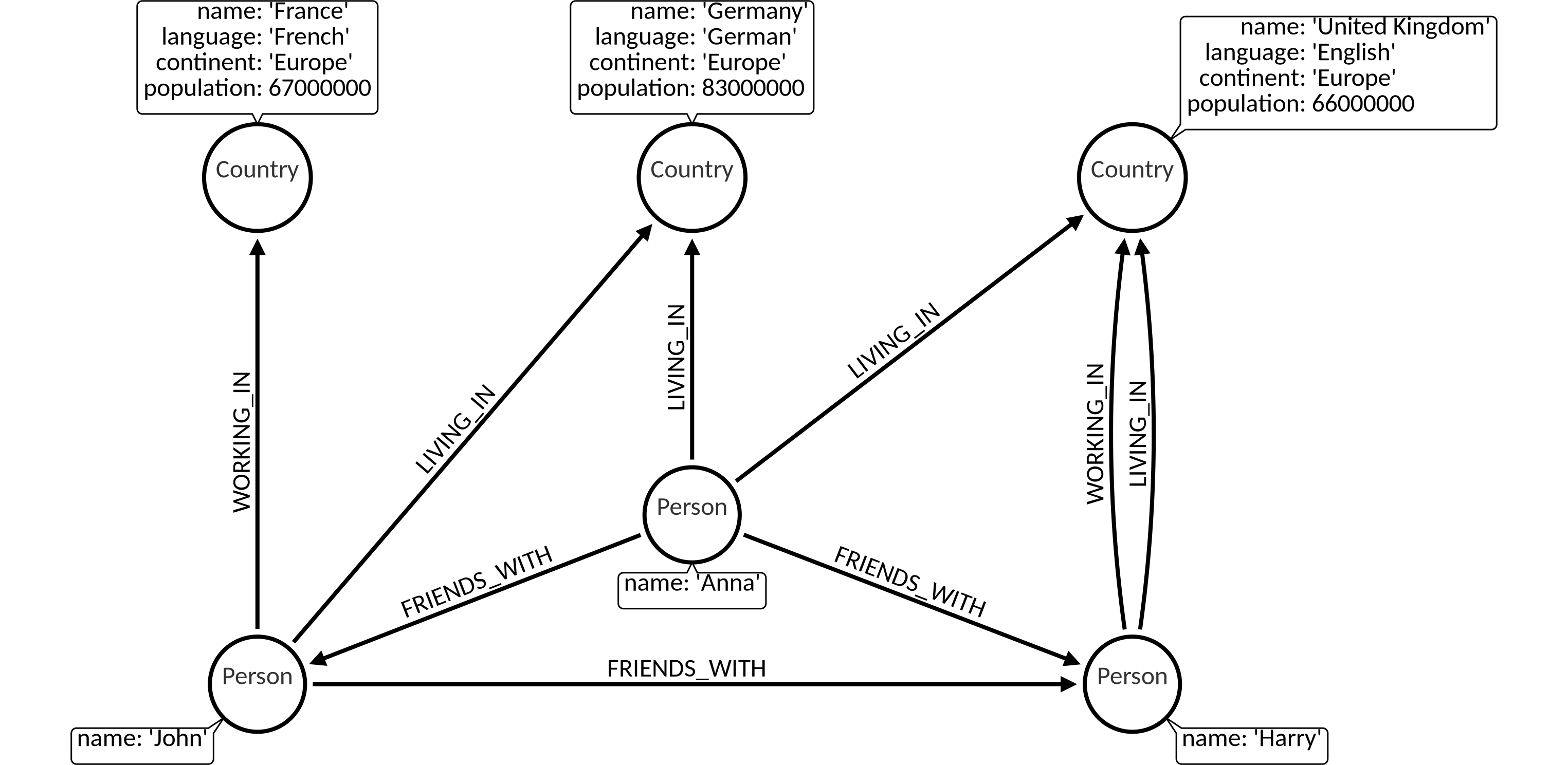UNION clause
The UNION clause is used to combine the result of multiple queries.
Dataset
The following examples are executed with this dataset. You can create this dataset locally by executing the queries at the end of the page: Dataset queries.

1. Combine queries and retain duplicates
To combine two or more queries and return their results without removing duplicates, use the UNION ALL clause.
First, let’s add a few existing nodes to the dataset:
CREATE (:Person {name: 'John'});
CREATE (:Person {name: 'Anna'});A query with the UNION ALL clause could look like this:
MATCH (c:Country)
RETURN c.name as columnName
UNION ALL
MATCH (p:Person)
RETURN p.name AS columnName;Output:
+----------------+
| columnName |
+----------------+
| Germany |
| France |
| United Kingdom |
| John |
| Harry |
| Anna |
| John |
| Anna |
+----------------+2. Combine queries and remove duplicates
To combine two or more queries and return their results while removing duplicates, use the UNION clause without ALL.
MATCH (c:Country)
RETURN c.name as columnName
UNION
MATCH (p:Person)
RETURN p.name AS columnName;Output:
+----------------+
| columnName |
+----------------+
| Germany |
| France |
| United Kingdom |
| John |
| Harry |
| Anna |
+----------------+Dataset queries
We encourage you to try out the examples by yourself. You can get our dataset locally by executing the following query block.
MATCH (n) DETACH DELETE n;
CREATE (c1:Country {name: 'Germany', language: 'German', continent: 'Europe', population: 83000000});
CREATE (c2:Country {name: 'France', language: 'French', continent: 'Europe', population: 67000000});
CREATE (c3:Country {name: 'United Kingdom', language: 'English', continent: 'Europe', population: 66000000});
MATCH (c1),(c2)
WHERE c1.name= 'Germany' AND c2.name = 'France'
CREATE (c2)<-[:WORKING_IN {date_of_start: 2014}]-(p:Person {name: 'John'})-[:LIVING_IN {date_of_start: 2014}]->(c1);
MATCH (c)
WHERE c.name= 'United Kingdom'
CREATE (c)<-[:WORKING_IN {date_of_start: 2014}]-(p:Person {name: 'Harry'})-[:LIVING_IN {date_of_start: 2013}]->(c);
MATCH (p1),(p2)
WHERE p1.name = 'John' AND p2.name = 'Harry'
CREATE (p1)-[:FRIENDS_WITH {date_of_start: 2011}]->(p2);
MATCH (p1),(p2)
WHERE p1.name = 'John' AND p2.name = 'Harry'
CREATE (p1)<-[:FRIENDS_WITH {date_of_start: 2012}]-(:Person {name: 'Anna'})-[:FRIENDS_WITH {date_of_start: 2014}]->(p2);
MATCH (p),(c1),(c2)
WHERE p.name = 'Anna' AND c1.name = 'United Kingdom' AND c2.name = 'Germany'
CREATE (c2)<-[:LIVING_IN {date_of_start: 2014}]-(p)-[:LIVING_IN {date_of_start: 2014}]->(c1);
CREATE (:Person {name: 'John'});
CREATE (:Person {name: 'Anna'});
MATCH (n)-[r]->(m) RETURN n,r,m;